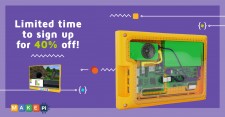How Your Children Can Benefit From Learning How to Code With MakePi

SAN FRANCISCO, September 27, 2017 (Newswire.com) - Coding, also known as “computer programming,” is so deeply embedded in our daily routine that it has become virtually impossible to get through the day without acknowledging the results of coding. Cash withdraws, traffic lights synchronization, biometric identity checking, instant messaging… the list goes on.
Whether you are embracing or repelling these facts, encouraging children to learn coding has become imperative because they do thrive in environments where they understand expectations. Therefore, family engagement plays a major role promoting environments that combine age-appropriate technology with real-life situations. MakePi believes that by inspiring children to learn purpose-driven-coding, they will be more willing to make rather than buying or consuming solutions. In the future, children will no longer be simple computer users, but potentially programmers by understanding several languages that give orders to computers.
How your children can benefit from learning how to code with MakePi
MakePi provides, today, both hardware and software learning experiences within the same product: the MakePad. First, MakePi has recently applied the DIY concept with the MakePad to promote the maker’s movement from early educational stages throughout K-12’s years. Besides assembling all the components by themselves, students might even upgrade the MakePad with multiple peripherals and additional hardware because MakePi has kept all USB and GPIO ports of its RaspberryPi CPU free. Second, once running, the MakePad delivers coding experiences with our embarked applications, such as the Make-Mods and Make-Music, both of which challenge kids and teenagers to create their own mods on the Minecraft platform and original digital music by using the Blockly language. Python language is also supported for text-based coding.
Embrace your children’s future
Speaking a second language makes you work with both sides of your brain. That is probably one of the reasons why Steve Jobs once said that “everyone should learn how to program a computer, because it teaches you how to think.”
Coding is not necessarily a life-lasting-decision, neither a vocational-gifted-gene heritage. Instead, think of coding as one meaningful component of our children’s curriculum. Furthermore, from one holistic point of view, learning how to code copes with developing creativity, communication, collaboration and critical thinking to solve real-life problems. All of which are the foundation of STEM education.
Want to learn more? Visit us at www.makepi.com and make sure to subscribe for news and much more!
Source: MakePi
